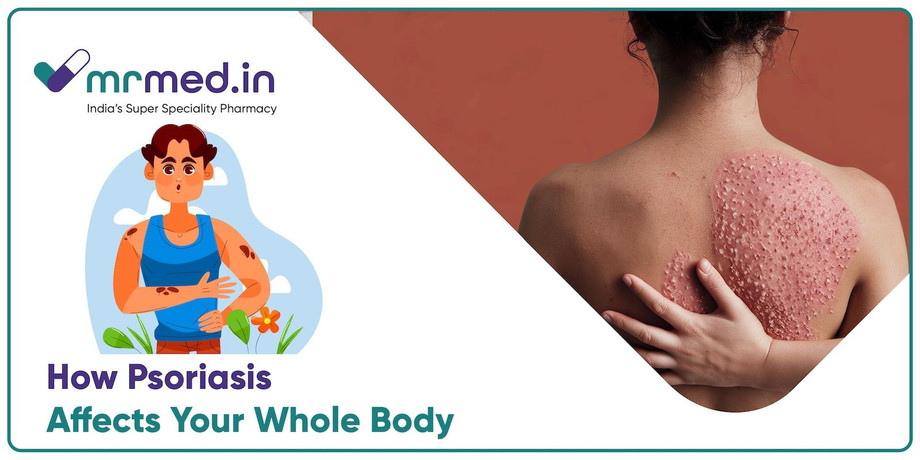Plaque psoriasis is more than just a skin issue—it’s a chronic autoimmune disorder that can affect your whole body. While it’s often seen as a cosmetic concern due to visible plaques, the impact stretches far beyond the skin. Research shows plaque psoriasis is linked to higher risks of heart disease, mental health challenges, and metabolic issues.
Understanding this connection empowers patients to manage not only their skin but their overall health.
What is Plaque Psoriasis?
Plaque psoriasis is the most familiar form of psoriasis, a long-term skin condition where skin cells grow and multiply too quickly. This rapid turnover results in thick, scaly patches or plaques that often appear on areas like the scalp, elbows, knees, and lower back. While the visible symptoms are evident on the skin, plaque psoriasis is rooted in a deeper immune system malfunction that causes inflammation throughout the body. Key points about plaque psoriasis:
-
Appearance: Thick, scaly patches or plaques, commonly on the scalp, elbows, knees, and lower back.
-
Symptoms: Itchy, painful, and sometimes cracked or bleeding patches.
-
Cause: Primarily linked to an immune system dysfunction that leads to inflammation.
-
Triggers: Stress, infections, and some medications can worsen symptoms and lead to flare-ups.
-
Impact: It affects not just the skin but can have broader implications on a person's overall health and quality of life.
Plaque psoriasis is thought to result from genetic and environmental factors, with managing both symptoms and overall health being crucial.
Does Plaque Psoriasis cause heart problems?
Plaque psoriasis is linked to an increased risk of cardiovascular disease due to the chronic inflammation it causes. This inflammation can damage blood vessels, raise blood pressure, and promote fatty plaque buildup in arteries, all of which heighten the risk of heart attacks and strokes. Key points are:
-
Increased cardiovascular risk: Moderate to severe psoriasis is linked with a more increased risk of heart disease.
-
Impact of inflammation: Chronic inflammation can damage blood vessels and raise blood pressure.
-
Risk factors: The severity of psoriasis combined with factors like smoking, obesity, or hypertension worsens the risk.
-
Prevention: Regular heart health monitoring, a heart-healthy lifestyle, and managing stress are crucial for those with plaque psoriasis.
Is Psoriasis associated with metabolic syndrome?
Plaque psoriasis is closely connected to metabolic syndrome, a group of conditions that raise the risk of heart disease, stroke, and type 2 diabetes. The chronic inflammation caused by psoriasis can disrupt normal metabolic function, making individuals more susceptible to these conditions.
-
Metabolic syndrome risk: Psoriasis increases the likelihood of high blood pressure, high blood sugar, abdominal fat, and abnormal cholesterol.
-
Obesity: People with psoriasis, especially in severe cases, are more likely to be overweight or obese, which increases the risk of heart disease and diabetes.
-
Weight management: Maintaining a proper healthy weight is key to managing psoriasis and reducing the risk of related health problems.
How does mental health affect Psoriasis?
Plaque psoriasis doesn’t just affect the body—it can also take an effective toll on mental health. The visible skin patches, constant flare-up worries, and challenges in managing the condition often lead to anxiety, depression, and social stress.
-
Mental health impact: Visible symptoms can cause self-consciousness, anxiety, and depression.
-
Increased risk of depression: Severe psoriasis increases the likelihood of mental health struggles.
-
Emotional toll: Chronic flare-ups, discomfort, and appearance concerns add stress to daily life.
-
Support is vital: Therapy, support groups, and open communication with healthcare providers can help manage mental health challenges.
Treatment for Psoriasis: What options are available?
Managing plaque psoriasis requires a comprehensive approach, with advancements in treatment options providing new hope for those affected. In the treatment for psoriasis, the goal is to reduce inflammation, control flare-ups, and enhance quality of life. For moderate to severe cases, systemic therapies, such as injections, may be necessary when topical treatments fall short.
-
Treatment goal: Reduce inflammation, control flare-ups, and improve quality of life.
-
Stelara injection: It contains Ustekinumab, which targets immune system components that contribute to psoriasis inflammation.
-
How it works: Blocks specific immune pathways, helping reduce inflammation and improve skin symptoms.
-
Administration: It is injected and can be combined with other treatments, depending on severity.
-
Consultation needed: It's important to discuss with a healthcare provider to determine if it is right for you, as psoriasis experiences vary.
Wrapping up
Plaque psoriasis is not just a skin condition; it’s a complicated disorder that can affect multiple aspects of health. Understanding its impact on overall well-being is crucial for effective management. Whether it's related to cardiovascular issues, metabolic syndrome, mental health challenges, or the inflammation driving these conditions, addressing psoriasis as part of a broader health strategy is essential.
With advances in treatments and an emphasis on lifestyle changes, individuals with plaque psoriasis can take proactive steps to manage their condition and protect their long-term health.

